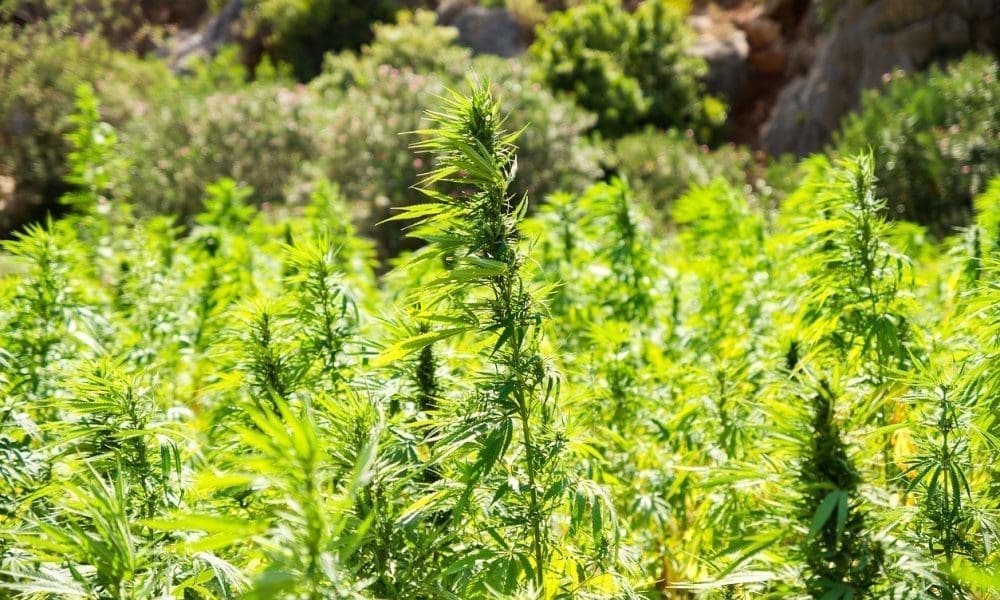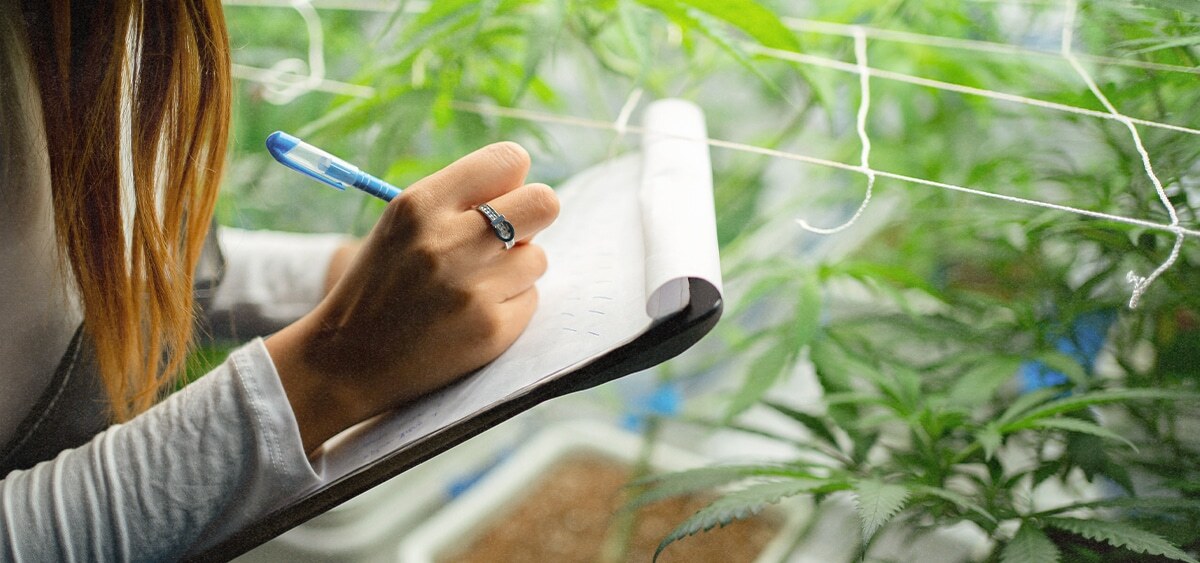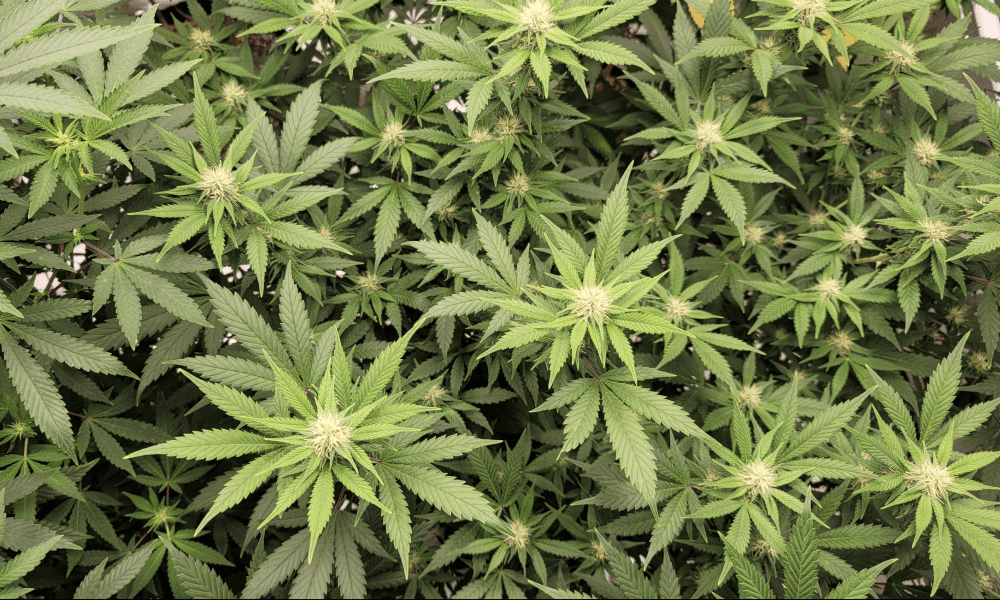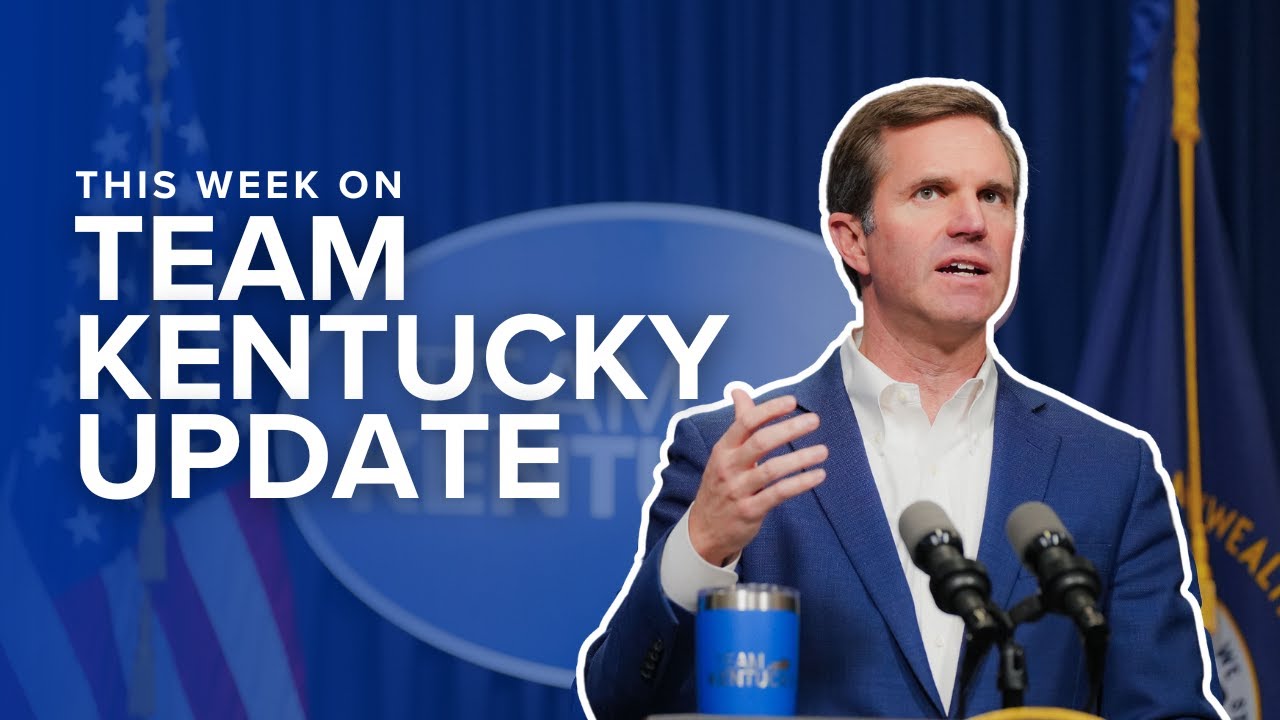featured
Rand Paul Says GOP Congressman’s Hemp Ban Bill Would ‘Completely Destroy’ The Industry
Published
16 hours agoon

A GOP senator says that an effort to ban THC hemp products that’s advancing in the Republican-controlled House would “completely destroy” the industry.
Sen. Rand Paul (R-KY) told Marijuana Moment on Thursday that he’s opposed to cannabis language included in a House agriculture spending bill that’s being championed by noted prohibitionist Rep. Andy Harris (R-MD).
Asked for his thoughts on the proposal, the senator said “they have an appropriations bill that I think would completely destroy the American hemp industry.”
“I don’t know how you’d be able to sell CBD oil with that,” he said, echoing arguments from certain hemp stakeholders who say the legislation as currently drafted would ban not only synthetic intoxicating cannabinoids like delta-8 THC but also most hemp-derived non-intoxicating cannabidiol products.
While Harris amended report language attached to the bill that clarifies it’s not the intent of the committee to stop people from accessing “industrial or nonintoxicating hemp-derived cannabinoid products with trace or insignificant amounts of THC,” the bill itself still says that products containing any “quantifiable” amounts of THC couldn’t be marketed. And it’s rare to find CBD items without any natural traces of THC.
Paul recently filed a bill that would go in the opposite direction of Harris’s ban, proposing to triple the concentration of THC that the crop could legally contain, while addressing multiple other concerns the industry has expressed about federal regulations.
The senator introduced the legislation, titled the Hemp Economic Mobilization Plan (HEMP) Act, last week. It mirrors versions he’s sponsored over the last several sessions.
Hemp and its derivatives were legalized under the 2018 Farm Bill, but the industry has experienced multiple setbacks in the years since—and the proliferation of intoxicating cannabinoid products has led to pushes in Congress and state legislatures across the country to reign in the largely unregulated market.
Harris, for his part, told Marijuana Moment last week that he’s not concerned about any potential opposition in the Senate—and he also disputed reports about the scope of what his legislation would do to the industry.
The 2026 spending legislation that contains provisions to ban consumable hemp products with any quantifiable amount of THC advanced out of the House Appropriations Committee on Monday and is now headed to the floor before potentially getting taken up by the Senate.
Harris—who serves as chair of the House Appropriations Subcommittee on Agriculture, Rural Development, Food and Drug Administration, and Related Agencies—also noted in the interview with Marijuana Moment that there “was no opposition [to the hemp provisions] that came up in committee, that’s for sure.”
He also briefly weighed in on the Texas governor’s recent veto of a bill to recriminalize hemp products with any THC—simply stating that he’s “not paying attention to what a single state is doing” while he focuses on enacting the proposed federal ban.
The language in the congressional bill, meanwhile, would still effectively eliminate the most commonly marketed hemp products within the industry, as even non-intoxicating CBD items that are sold across the country typically contain trace amounts of THC. Under current law, those products are allowed if they contain no more than 0.3 percent THC by dry weight.
The proposed policy championed by Harris would drastically change that. It would instead maintain the legal status of “industrial hemp” under a revised definition that allows for the cultivation and sale of hemp grown for fiber, whole grain, oil, cake, nut, hull, microgreens or “other edible hemp leaf products intended for human consumption.”
The Congressional Research Service (CRS) released a report this month stating that the legislation would “effectively” prohibit hemp-derived cannabinoid products. Initially it said that such a ban would prevent the sale of CBD as well, but the CRS report was updated to exclude that language for reasons that are unclear.
The hemp language is largely consistent with appropriations and agriculture legislation that was introduced, but not ultimately enacted, under the last Congress.
Hemp industry stakeholders rallied against that proposal, an earlier version of which was also included in the base bill from the subcommittee last year. It’s virtually identical to a provision of the 2024 Farm Bill that was attached by a separate committee last May via an amendment from Rep. Mary Miller (R-IL), which was also not enacted into law.
There are some differences between the prior spending bill and this latest version for 2026, including a redefining of what constitutes a “quantifiable” amount of THC that’d be prohibited for hemp products.
It now says that a quantifiable amount is “based on substance, form, manufacture, or article (as determined by the Secretary of Health and Human Services in consultation with the Secretary of Agriculture),” whereas it was previously defined as an amount simply “determined by the Secretary in consultation with the Secretary of Health and Human Services.”
The proposed legislation also now specifies that the term hemp does not include “a drug that is the subject of an application approved under subsection (c) or (j) of section 505 of the Federal Food, Drug, and Cosmetic Act (21 U.S.C. 355),” which seems to carve out an exception for Food and Drug Administration- (FDA) approved drugs such Epidiolex, which is synthesized from CBD.
A leading alcohol industry association, meanwhile, has called on Congress to dial back language in the House spending bill that would ban most consumable hemp products, instead proposing to maintain the legalization of naturally derived cannabinoids from the crop and only prohibit synthetic items.
Wine & Spirits Wholesalers of America (WSWA) President and CEO Francis Creighton said in a press release that “proponents and opponents alike have agreed that this language amounts to a ban.”
“By pushing a rapidly evolving industry back into the shadows, Congress is creating even more chaos in the marketplace, undermining state initiatives and punishing responsible actors,” he said. “We urge the full House to reconsider this approach. States can regulate intoxicating products safely and effectively through systems that preserve consumer trust and public safety. It’s time for Congress to follow their lead, not override their authority.”
Members of WSWA also met with lawmakers and staffers in April to advocate for three key policy priorities that the group says is based on “sound principles of alcohol distribution.” They include banning synthetic THC, setting up a federal system for testing and labeling products and establishing state-level power to regulate retail sales.
Separately, key GOP congressional lawmakers—including one member who supports marijuana legalization—don’t seem especially concerned about provisions in the bill despite concern from stakeholders that it would put much of the hemp industry in jeopardy by banning most consumable products derived from the plant.
—
Marijuana Moment is tracking hundreds of cannabis, psychedelics and drug policy bills in state legislatures and Congress this year. Patreon supporters pledging at least $25/month get access to our interactive maps, charts and hearing calendar so they don’t miss any developments.![]()
Learn more about our marijuana bill tracker and become a supporter on Patreon to get access.
—
Jonathan Miller, general counsel of the U.S. Hemp Roundtable, told congressional lawmakers in April that the market is “begging” for federal regulations around cannabis products.
At the hearing, Rep. James Comer (R-KY) also inquired about FDA inaction around regulations, sarcastically asking if it’d require “a gazillion bureaucrats that work from home” to regulate cannabinoids such as CBD.
A report from Bloomberg Intelligence (BI) last year called cannabis a “significant threat” to the alcohol industry, citing survey data that suggests more people are using cannabis as a substitute for alcoholic beverages such a beer and wine.
Last November, meanwhile, a beer industry trade group put out a statement of guiding principles to address what it called “the proliferation of largely unregulated intoxicating hemp and cannabis products,” warning of risks to consumers and communities resulting from THC consumption.
The LCB contributed reporting from Washington, D.C.
Photo courtesy of Pixabay.

Author: mscannabiz.com
MScannaBIZ for all you Mississippi Cannabis News and Information.
You may like
-


The best strains for making hash
-


Nebraska Officials Propose Emergency Medical Cannabis Regulations
-


Temple Ball Hash Tutorial: From Dry Sift to Cure-Ready Resin
-


Kentucky Medical Marijuana Growers Will Be ‘Putting Seed In The Ground Really Soon,’ Governor Says
-


How to make dry sift hash: a solventless masterclass
-


Marijuana Industry Lawsuit Has ‘Zero Chance’ Of Being Heard By Supreme Court, Former DOJ Lawyer Says (Op-Ed)
featured
Nebraska Officials Propose Emergency Medical Cannabis Regulations
Published
37 minutes agoon
June 30, 2025
The Nebraska Medical Cannabis Commission last week approved emergency regulations to begin accepting medical cannabis applications as soon as Gov. Jim Pillen (R) allows the agency to proceed, the Nebraska Examiner reports. Under the state’s voter-approved medical cannabis law, the commission must start accepting applications by July 1.
The regulations largely mirror a legislative proposal that failed in the legislature last month and would remain in effect for 90 days after being approved by the governor.
Under the medical cannabis law, medical cannabis licensing must begin by October 1, and the emergency regulations would allow for the licensing of cultivators, product manufacturers, dispensaries, and transporters, with individuals or organizations only permitted one type of license.
Under the emergency regulations, only one dispensary would be allowed in each of the state’s 12 District Court Judicial Districts; no dispensary could be located within 1,000 feet of any school, daycare, church or hospital; at least 51% of an applicant’s business or organization must have resided in Nebraska and be a U.S. citizen for at least the past four years; and applicants would have to pay to submit two legible sets of fingerprints to the FBI and the Nebraska State Patrol for a criminal background check.
The regulations do not specify qualifying conditions for medical cannabis access but require that a physician’s recommendation specifies the product being recommended, the recommended dosage and potency, the number of doses, the directions for use, and the name of the patient.
The regulations allow dispensaries to sell oral tablets, capsules, or tinctures; non-sugarcoated gelatinous cubes, gelatinous rectangular cuboids, or lozenges in a cube or rectangular cuboid shape; topical preparations; suppositories; transdermal patches; and liquids or oils for administration using a nebulizer or inhaler. Flower is not permitted under the regulations, neither are infused food or drinks, any products containing artificial or natural flavoring or coloring, or any products that can be smoked or vaped.

Author: mscannabiz.com
MScannaBIZ for all you Mississippi Cannabis News and Information.
featured
Kentucky Medical Marijuana Growers Will Be ‘Putting Seed In The Ground Really Soon,’ Governor Says
Published
2 hours agoon
June 30, 2025
The governor of Kentucky says that he expects to see medical marijuana growers “putting seed in the ground really soon,” projecting that patients will have access to cannabis before the year’s end.
Speaking with reporters after his “Team Kentucky” update, Gov. Andy Beshear (D) was asked whether medical marijuana patients will have to wait until 2026 before dispensaries open and products are available.
“I hope not,” the governor said. “On medical marijuana, we’re getting really close—this fall and this winter, I think we are very close to doing our site visits to both growers and potentially even the first processor.”
“My sense is that it’s probably the processors—with the amount of equipment and the size of the investment there—that are going to drive that,” he said. “But the first set of growers are going to be putting seed in the ground really soon.”
Beshear added that he acknowledges “it’s taken longer than we would have liked” to stand up the industry since he signed medical marijuana legalization into law in 2023.

“But the law kind of set that up with how it had to be implemented,” he said.
The governor noted that, in recognition of the delayed implementation, he recently signed an executive order to waive renewal fees for patients who get their cards this year so that they don’t get charged again before retailers open. And another order he signed providing protections for qualified patients who obtain medical marijuana outside of Kentucky “will stay in place.”
“We’re making sure that that doesn’t hold us back from getting the other parts open, because we’re opening all these different parts at the same time,” he said. “So almost all of our dispensaries [that received licenses] now have their final counties. I think we will have all of them with the final counties here in about a month.”
Beshear separately announced this month that the state has launched a new online directory that lets people see where medical cannabis dispensaries will be opening near them.
He emphasized that the state has been working to deliver access to patients “at the earliest possible date,” and that involved expediting the licensing process. The governor in January also ceremonially awarded the commonwealth’s first medical marijuana cards.
—
Marijuana Moment is tracking hundreds of cannabis, psychedelics and drug policy bills in state legislatures and Congress this year. Patreon supporters pledging at least $25/month get access to our interactive maps, charts and hearing calendar so they don’t miss any developments.![]()
Learn more about our marijuana bill tracker and become a supporter on Patreon to get access.
—
Meanwhile, the governor sent a letter to Kentucky’s congressional delegation in January, “urging them to take decisive action to protect the constitutional rights of our law abiding medical cannabis patients” by repealing the federal ban on gun possession by people who use marijuana.
That came after bipartisan Kentucky senators filed legislation that similarly called on the state’s federal representatives to take corrective action, which Beshear said he supports but would like to see even more sweeping change on the federal level.
The federal Bureau of Alcohol, Tobacco, Firearms and Explosives (ATF) warned Kentucky residents late last year that, if they choose to participate in the state’s medical marijuana program, they will be prohibited from buying or possessing firearms under federal law.
As far as the implementation of the state’s medical cannabis law goes, Beshear said in his State of the Commonwealth address in January that patients will have access to cannabis sometime “this year.” He also later shared tips for patients to find a doctor and get registered to participate in the cannabis program.
Health practitioners have been able to start assessing patients for recommendations since the beginning of December.
While there currently aren’t any up-and-running dispensaries available to patients, Beshear has further affirmed that an executive order he signed in 2023 will stay in effect in the interim, protecting patients who possess medical cannabis purchased at out-of-state licensed retailers.
During last year’s November election, Kentucky also saw more than 100 cities and counties approve local ordinances to allow medical cannabis businesses in their jurisdictions. The governor said the election results demonstrate that “the jury is no longer out” on the issue that is clearly supported by voters across partisan and geographical lines.
New Chicago Police Policy Discourages Searches Based On Marijuana Odor
Photo courtesy of Mike Latimer.

Author: mscannabiz.com
MScannaBIZ for all you Mississippi Cannabis News and Information.
featured
Marijuana Industry Lawsuit Has ‘Zero Chance’ Of Being Heard By Supreme Court, Former DOJ Lawyer Says (Op-Ed)
Published
3 hours agoon
June 30, 2025
“The odds are always against the Supreme Court hearing any particular case, but the cannabis industry’s approach in this one absolutely ensures it won’t happen.”
By James B. Mann, former U.S. Department of Justice Tax Division deputy assistant attorney general
A much-hyped lawsuit meant to challenge federal cannabis law has officially flamed out. The First Circuit Court of Appeals recently issued a unanimous opinion rejecting Canna Provisions v. Garland (also known as Canna Provisions v. Bondi), a case widely seen as the cannabis industry’s best shot at attacking federal prohibition through the courts.
The case was intended to strike down cannabis’s Schedule I classification under the Controlled Substances Act and eliminate the crushing tax burden imposed by Section 280E of the Internal Revenue Code. Instead, it ended in a resounding defeat—with precisely zero chance of being heard by the Supreme Court.
Section 280E is one of the most punishing burdens facing the legal cannabis industry. Originally enacted in the 1980s to prevent drug traffickers from deducting business expenses, 280E blocks cannabis operators—even fully legal ones under state law—from writing off ordinary costs like rent, payroll or equipment. The result is that cannabis businesses often pay two to three times more in federal income tax than they would if they sold any other legal product.
The cannabis industry’s battle against 280E is now being waged across all three branches of government. Congress is being lobbied for legislative relief. The executive branch is being pressured to reschedule cannabis so 280E no longer applies. And the judiciary has been pulled in through legal challenges like Canna Provisions.
The lawsuit was filed with much fanfare in October 2023—it was funded by many of the large cannabis companies and used a big-name law firm, Boies Schiller. The goal was to overturn a 2005 Supreme Court decision, Gonzales v. Raich. In Raich, the Court upheld the Controlled Substances Act as applied to cannabis grown solely for personal medical use within one state.
Boies Schiller essentially made two arguments—first, that the realities of the cannabis market had changed so much since 2005 that Raich was outdated and wrong, and second, that Congress had passed legislation proving cannabis no longer belongs in Schedule I. The First Circuit wasn’t having any of it. The 3-0 opinion pointed out that even though the facts had changed, they had not changed enough to make Congress’s classification irrational as part of a comprehensive regime of drug regulation (the relevant test).
The court also dismissed the claim that federal legislation proved cannabis should be removed from Schedule I. The opinion noted that the funding restrictions were limited in their effect and applied only to medical cannabis (Canna Provisions and the other plaintiffs are adult-use sellers).
Interestingly, the opinion repeatedly criticizes the lack of logical development of Canna Provisions’s arguments, going so far as to dismiss one of the most important arguments for “lack of development.”
Supreme Court justices vote on what cases to hear, and it takes four votes to put a matter on the docket. In a lawsuit like Canna Provisions, there is no split among the circuit courts for the Supreme Court to resolve. That means the only real path to a hearing was to convince the justices that the case presented an urgent federal legal question.
There is one justice still on the bench from Raich—Justice Clarence Thomas. His dissent in that case, and his opinions in other Commerce Clause cases, emphasize his belief that federal power has stretched far beyond the Framers’ intent. Justice Sandra Day O’Connor’s dissent also argued that the federal law intruded on core state powers.
Bizarrely, Boies Schiller never raised the arguments made by either Thomas or O’Connor. It’s unclear who they thought would vote to hear the case based on the strategy they pursued.
And while oral argument isn’t usually a decisive factor in appellate decisions, it didn’t help that David Boies was completely shredded by the three-judge panel. (The First Circuit has publicly available recordings of oral arguments.) Boies was once one of the most prominent litigators of his generation—there’s even a chapter in a Malcolm Gladwell book about his mind and how he overcame dyslexia. But at 84, he was unprepared for basic questions and clearly no longer at his peak.
The odds are always against the Supreme Court hearing any particular case, but the cannabis industry’s approach in this one absolutely ensures it won’t happen. More broadly, Canna Provisions underscores the complexity of using litigation to advance federal cannabis reform. While carefully crafted legal challenges may still have a role, this case failed to present the type of arguments or posture that could realistically have drawn the Supreme Court’s interest.
James B. Mann is a tax attorney whose practice centers on cannabis taxation and complex business tax planning. A Harvard Law and Columbia MBA graduate, he previously served as deputy assistant attorney general in the U.S. Department of Justice’s Tax Division, led tax-debt advisory at Société Générale, and represented major cannabis clients—including arguing the Harborside case in the Ninth Circuit.
Photo elements courtesy of rawpixel and Philip Steffan.

Author: mscannabiz.com
MScannaBIZ for all you Mississippi Cannabis News and Information.

The best strains for making hash

Nebraska Officials Propose Emergency Medical Cannabis Regulations

Temple Ball Hash Tutorial: From Dry Sift to Cure-Ready Resin

Kentucky Medical Marijuana Growers Will Be ‘Putting Seed In The Ground Really Soon,’ Governor Says

How to make dry sift hash: a solventless masterclass

Marijuana Industry Lawsuit Has ‘Zero Chance’ Of Being Heard By Supreme Court, Former DOJ Lawyer Says (Op-Ed)

Mike Tyson Tells Trump To Reschedule Marijuana And Free Prisoners In Fox News Appearance
New Hampshire Bill To Ease Psilocybin Penalties Advances Through House But Is Tabled In Senate

Honoring LGBTQIA+ Cannabis Trailblazers: A Pride Month Reflection

Anacostia Organics: Cannabis with care in the capital

Doctors Group Launches Campaign Empowering More Healthcare Professionals To Join Drug Decriminalization Movement

Star signs and cannabis strains: July 2025 horoscopes

Using Hemp Flour And Oil Can Make Gluten-Free Baked Goods With ‘Optimal’ Texture And ‘Significant’ Nutrition, Study Shows

10 Alabama CBD Stores, Vape Shops Raided; 4 Hemp Businesses Sue State

Four Arrested for CBD Distillate Theft Valued at $3.6M

ALEA raids 9 stores across Alabama for allegedly violating state marijuana laws

What’s Changed Since Connecticut Legalized Adult-Use Marijuana 4 Years Ago?

Police: Man caught with 250 pounds of marijuana

California Cannabis Excise Tax Hike Takes Effect as Consumers Face Mounting Cost-of-Living Crisis

First legal cannabis dispensary to open in Genesee County

Judge Dismisses Lawsuit Seeking to Invalidate Nebraska Medical Cannabis Reforms

Mike Tyson leads athletes in push for marijuana reform: 'Cannabis is not a drug'

Rand Paul Says GOP Congressman’s Hemp Ban Bill Would ‘Completely Destroy’ The Industry

Cannabis legalization could help GOP win young voters, former congressman says (Newsletter: June 30, 2025)

Alert: Department of Cannabis Control updates data dashboards with full data for 2023

Connecticut Appoints The US’s First Cannabis Ombudsperson – Yes there is a pun in there and I’m Sure Erin Kirk Is Going To Hear It More Than Once!

5 best CBD creams of 2024 by Leafly

Free delta-9 gummies from Bay Smokes

EU initiative begins bid to open access to psychedelic therapies
New Study Analyzes the Effects of THCV, CBD on Weight Loss

Mississippi city official pleads guilty to selling fake CBD products

Curaleaf Start Process Of Getting Their Claws Into The UK’s National Health System – With Former MP (Resigned Today 30/5/24) As The Front Man

May 2024 Leafly HighLight: Pink Runtz strain

5 best autoflower seed banks of 2024 by Leafly

Horn Lake denies cannabis dispensary request to allow sale of drug paraphernalia and Sunday sales | News

Discover New York’s dankest cannabis brands [September 2024]

Press Release: CANNRA Calls for Farm Bill to Clarify Existing State Authority to Regulate Hemp Products

Nevada CCB to Accept Applications for Cannabis Establishments in White Pine County – “Only one cultivation and one production license will be awarded in White Pine County”

Local medical cannabis dispensary reacts to MSDH pulling Rapid Analytics License – WLBT

6 best CBD gummies of 2024 by Leafly

The Daily Hit: October 2, 2024

5 best THC drinks of 2024 by Leafly

5 best delta-9 THC gummies of 2024 by Leafly

Weekly Update: Monday, May 13, 2024 including, New Guide for Renewals & May Board meeting application deadline

People In This State Googled ‘Medical Marijuana’ The Most, Study Shows

Thailand: Pro-cannabis advocates rally ahead of the government’s plan to recriminalize the plant

PRESS RELEASE : Justice Department Submits Proposed Regulation to Reschedule Marijuana

Press Release: May 9, STIIIZY and Healing Urban Barrios hosted an Expungement Clinic & Second Chance Resource Fair
Trending
-

 California Cannabis Updates1 year ago
California Cannabis Updates1 year agoAlert: Department of Cannabis Control updates data dashboards with full data for 2023
-

 Breaking News1 year ago
Breaking News1 year agoConnecticut Appoints The US’s First Cannabis Ombudsperson – Yes there is a pun in there and I’m Sure Erin Kirk Is Going To Hear It More Than Once!
-

 best list11 months ago
best list11 months ago5 best CBD creams of 2024 by Leafly
-

 Bay Smokes1 year ago
Bay Smokes1 year agoFree delta-9 gummies from Bay Smokes
-

 Business10 months ago
Business10 months agoEU initiative begins bid to open access to psychedelic therapies
-

 cbd1 year ago
cbd1 year agoNew Study Analyzes the Effects of THCV, CBD on Weight Loss
-

 Mississippi Cannabis News1 year ago
Mississippi Cannabis News1 year agoMississippi city official pleads guilty to selling fake CBD products
-

 Breaking News1 year ago
Breaking News1 year agoCuraleaf Start Process Of Getting Their Claws Into The UK’s National Health System – With Former MP (Resigned Today 30/5/24) As The Front Man

